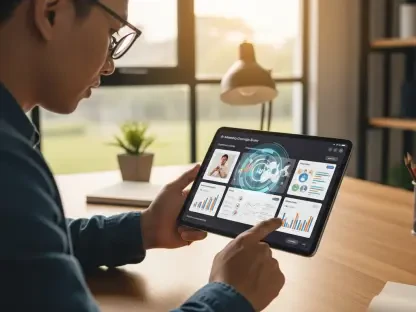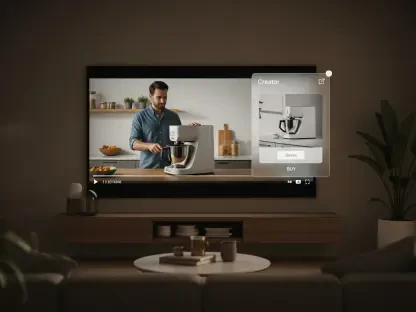In the dynamic world of digital marketing, businesses are increasingly focusing on mobile marketing as a pivotal strategy for enhancing customer loyalty and engagement. Amidst the proliferation of smartphones and mobile applications, companies are discovering new methods to reach and engage their customer base in a more personalized manner. The integration of mobile marketing into loyalty programs is becoming a significant factor in retaining customers and fostering long-term relationships. With an overwhelming number of consumers relying on their mobile devices for daily activities, businesses that harness the power of mobile technology are finding themselves at a considerable advantage within the competitive landscape. This drives a profound exploration into whether mobile marketing truly holds the key to boosting customer loyalty, making it a critical conversation for industry leaders.
The Rise of Mobile-First Loyalty Programs
As mobile devices continue their unequivocal rise in indispensability, businesses have taken note, directing their loyalty strategies towards mobile-first approaches. This paradigm shift is underpinned by the unparalleled reach and engagement potential offered by mobile platforms. Companies are investing significantly in developing mobile apps specifically tailored to enhance user experience and engagement. Statistics reveal that a vast portion of businesses are increasing their investment in digital loyalty programs, demonstrating a strong commitment to integrating technology into their marketing strategies.
The essence of mobile-first loyalty programs lies in their ability to deliver highly personalized interactions. By leveraging unique identifiers such as device IDs, companies can track user behavior across different platforms, enabling them to offer tailored experiences that resonate more profoundly with their customers. This approach not only enhances user satisfaction but also fosters a stronger emotional connection, which is vital for customer loyalty. The capability of mobile apps to overcome limitations inherent with cookies on the web further showcases their value in delivering these personalized experiences. Businesses have observed that the more personalized the interaction, the greater the likelihood of retaining customers, highlighting the critical role of mobile technology in modern loyalty strategies.
Moreover, mobile loyalty programs facilitate seamless integration with broader marketing efforts, creating an omnichannel experience that meets customers at various touchpoints. This comprehensive strategy ensures that interactions across all channels are cohesive and consistent, thereby reinforcing brand messaging and trust. Employing a mobile-first approach also empowers businesses to offer exclusive content and experiences straight to customers’ fingertips, enhancing the perceived value and engagement factor. It becomes evident that mobile marketing is not merely an enhancement but a necessary channel within a comprehensive loyalty strategy.
Personalization and Its Impact on Customer Engagement
Personalization has emerged as a cornerstone of effective mobile marketing and loyalty programs. As businesses strive to create meaningful connections with their customers, the emphasis on delivering personalized experiences has significantly intensified. Mobile marketing allows brands to harness data-driven insights to cater to specific customer needs and preferences, effectively creating a tailored experience that promotes customer satisfaction and loyalty.
A significant portion of brands acknowledges the necessity of personalization within loyalty programs. With mobile apps serving as a powerful vehicle for personalization, they enable businesses to collect invaluable data and insights into customer behaviors. This information forms the basis for curating personalized interactions that make customers feel valued and understood. For instance, companies like Domino’s have leveraged mobile technology to deliver customized promotions and offers directly through their apps, which has translated into increased sales and customer retention.
While personalization is undoubtedly paramount, the precision with which it is executed determines its effectiveness. Mobile marketing tools allow for advanced segmentation and targeting capabilities, enabling businesses to engage customers based on their specific behaviors, preferences, and purchase history. The ability to deliver the right message, to the right person, at the right time, is a powerful tool in maintaining customer interest and loyalty.
The significant investment in personalized mobile experiences is not only an indication of its impact but also a testament to its success. Brands that excel in this arena report improved customer satisfaction and loyalty metrics, with a noticeable uptick in customer lifetime value. Personalization, powered through mobile marketing strategies, emerges as a key driver in cultivating lasting relationships with customers.
The Strategic Integration of Mobile Marketing
A crucial aspect of successful mobile marketing lies in its strategic integration into existing marketing frameworks. While mobile platforms offer unique advantages, their true value is realized when integrated into a broader, multi-faceted approach. Businesses are increasingly adopting an omnichannel strategy that ensures consistency and alignment across all platforms, including in-store, online, and mobile interactions.
The integration of mobile marketing with other channels allows businesses to create a unified customer journey that enhances the overall brand experience. Instead of operating in isolation, mobile marketing serves as a complement, further enriching touchpoints and ensuring a seamless transition between channels. This alignment is crucial in maintaining brand consistency, ensuring that customers receive a familiar and reliable experience, regardless of how they interact with the brand.
Examples from industry leaders, such as the applications by Co-op and other retail giants, demonstrate how strategic integration creates additional value. Their mobile apps not only provide convenience but also serve as a central hub for customer interaction, offering a blend of online and offline engagement that sustains interest and draws customers back. These implementations highlight the necessity for businesses to adopt a holistic view, where mobile marketing is embedded within the broader strategy.
Additionally, the engagement mobile marketing facilitates offers invaluable feedback that further optimizes overall business strategies. Through data analytics, companies gain a deeper understanding of customer preferences, which feeds back into refining both mobile and overarching strategies. This iterative process of learning and adaptation ensures that mobile marketing efforts remain relevant and impactful, maintaining alignment with evolving customer expectations.
The Essential Role of Expertise and Execution
While the potential benefits of mobile marketing are undeniable, successful deployment hinges on expertise and meticulous execution. Businesses venturing into mobile marketing must prioritize quality over quantity, as poorly executed apps can deter users and erode brand trust. This highlights the essential role of partnering with experts to craft user-friendly and engaging mobile applications that align with brand objectives.
Expert consultation ensures that mobile strategies are not only well-designed but also effectively executed. This involves comprehensive testing and refinement to guarantee a seamless user experience, a crucial factor in maintaining customer satisfaction. Successful examples in the industry showcase the impact of well-executed mobile strategies, where high-quality apps foster an environment that encourages customer interaction and loyalty.
Additionally, businesses must remain vigilant to evolving technology trends and consumer behaviors to stay competitive. This involves continuous learning, adaptation, and re-evaluation of mobile strategies to ensure they keep pace with changing preferences. The expertise required extends beyond the initial launch; it involves sustained engagement and iterative improvements to maintain relevance and efficacy.
Ultimately, the success of mobile marketing strategies lies in their ability to deliver value-driven experiences that resonate with users. Expertise in execution, combined with a keen understanding of user expectations, equips businesses to navigate the complexities of mobile engagement effectively. As companies delve deeper into the digital landscape, ensuring the quality and relevance of mobile marketing efforts becomes an indispensable aspect of nurturing and maintaining customer loyalty.
Conclusion and Future Considerations
As mobile devices increasingly become integral to everyday life, businesses are reshaping their loyalty strategies to focus on mobile-first approaches. This shift is driven by the expansive reach and engagement capabilities that mobile platforms offer. Organizations are heavily investing in crafting mobile apps designed to enhance user experience and increase engagement. Data indicates a significant rise in businesses funneling resources into digital loyalty programs, underscoring their commitment to technology-driven marketing strategies.
Mobile-first loyalty programs excel in delivering personalized interactions. By harnessing unique identifiers like device IDs, companies can monitor user behavior across platforms, enabling them to provide experiences that deeply resonate with customers. This personalization boosts user satisfaction and builds a stronger emotional connection, crucial for customer loyalty. Mobile apps, unlike web cookies, excel in offering such personalized experiences. Businesses find that personalized interactions significantly increase customer retention, illustrating the pivotal role of mobile technology in current loyalty plans.
Furthermore, mobile loyalty programs seamlessly integrate with larger marketing efforts, creating an omnichannel experience that connects with customers at various touchpoints. This ensures consistency across channels, reinforcing brand messaging and trust. Adopting a mobile-first strategy allows businesses to deliver exclusive content directly to customers, enhancing perceived value and engagement. Thus, mobile marketing emerges as an essential channel in a holistic loyalty strategy, not just an enhancement.









